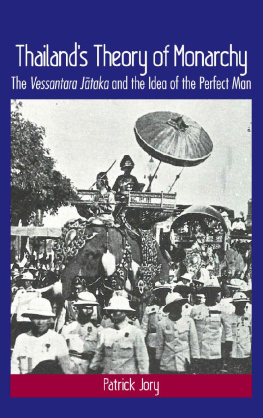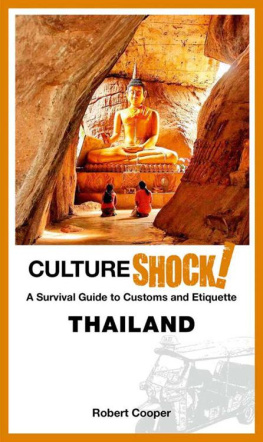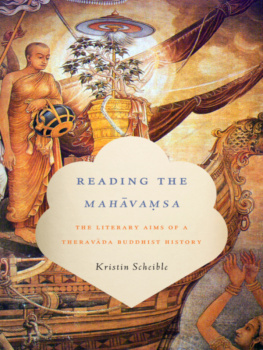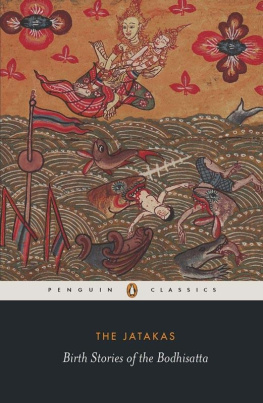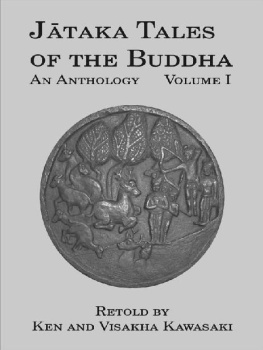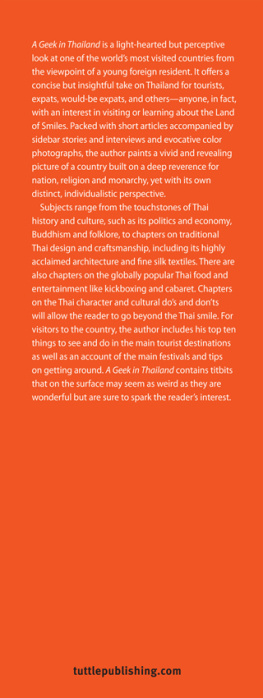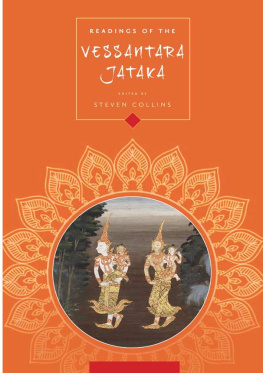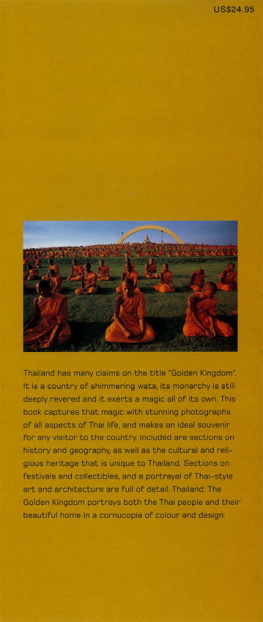Thailands Theory of Monarchy
Thailands Theory of Monarchy
The Vessantara Jtaka and the Idea of the Perfect Man
Patrick Jory
Published by State University of New York Press, Albany
2016 State University of New York
All rights reserved
Printed in the United States of America
No part of this book may be used or reproduced in any manner whatsoever without written permission. No part of this book may be stored in a retrieval system or transmitted in any form or by any means including electronic, electrostatic, magnetic tape, mechanical, photocopying, recording, or otherwise without the prior permission in writing of the publisher.
For information, contact State University of New York Press, Albany, NY
www.sunypress.edu
Production, Jenn Bennett
Marketing, Michael Campochiaro
Library of Congress Cataloging-in-Publication Data
Jory, Patrick, author.
Thailands theory of monarchy : the Vessantara Jtaka and the idea of the perfect man / Patrick Jory.
pages cm
Includes bibliographical references and index.
ISBN 978-1-4384-6089-5 (hardcover : alk. paper)
ISBN 978-1-4384-6090-1 (e-book)
1. MonarchyThailandHistory. 2. Buddhism and stateThailandHistory. 3. Tipitaka. Suttapitaka. Khuddakanikaya. Jtaka. Vessantara Jtaka. 4. ThailandKings and rulers. I. Title.
| JQ1746.J67 2016 |
| 320.959301dc23 | 2015026350 |
10 9 8 7 6 5 4 3 2 1
For Craig
Contents
Illustrations
Figures
Tables
Acknowledgments
This book has had a long gestation, and so the list of people to thank is also long.
My first and greatest debt of gratitude is to my former supervisor, Craig Reynolds of the Australian National University. Craig gave me a wholly new way of looking at the relationship between history, politics, culture, religion, and language. His reading and criticism of my work has always been caring, patient, and dedicated, and it has continued long since I finished my doctoral studies.
This book was only possible because of the cooperation of a large number of libraries and scholarly institutions. Vacharin McFadden, the former head librarian of the National Library of Australias superb Thai language collection, and Sophie Viravong, currently Senior Librarian, were invaluable in finding everything I could possibly need for the writing up of this research in Australia.
In Thailand, the staff at the National Research Council of Thailand were friendly, efficient, and very helpful in looking after all the administrative details of the fieldwork stage of this research. The staff at the many other institutions around the country all went out of their way to find materials or direct me to the right places. I wish to thank: the National Library (I am particularly grateful to Phinyo Sichamlong for letting me talk to him about my work on several occasions), the National Archives, the Siam Society, the libraries of Thammasat University, Silapakorn University, Chulalongkorn University, Ramkhamhaeng University, and Srinakharinwirot University (Prasarnmit campus) in Bangkok; the libraries of Mahasarakham Rajabhat University, the Mahasarakham campus of Srinakharinwirot University, and the Mahasarakham Cultural Centre; the libraries of Chiang Mai University and its Social Research Institute, and Chiang Mai Rajabhat University; and in the south the libraries of Nakhon Si Thammarat Teachers College, the Nakhon Si Thammarat branch of the National Library, Songkhla Rajabhat University, and the Institute of Southern Studies on Koh Yor.
I owe a debt of gratitude to the following people who generously gave up time from their busy schedules to allow me to talk to them about my work: at Chulalongkorn University, Chalong Soontravanich, Dhida Saraya, and Suwanna Kriengkraiphet; at Thammasat University, Warunee Osatharom and Sangworn Phromsen; and at Ramkhamhaeng University, Thawat Punnothok.
In Mahasarakham I am extremely grateful to Somchai and Supatra Nilathi and their family for hosting me and my wife during our stay in Mahasarakham. I am also especially thankful to Somchai Nilathi for sharing with me his deep knowledge of northeastern culture and history. Charuwan Thammawat, Thaweesin Subwatthana, and At Nanthachak were very helpful in guiding me in my research. My thanks also goes to the late Phra Pong of Wat Nakwichai, Central District, Mahasarakham, for our many conversations and for introducing me to his herbal saunas; to Phra Khru Sirithamwichit of Wat Nong Born, Kosumphisai district, Mahasarakham, for his firsthand knowledge as a nak thet of the thet maha chat ; and to Phra Khru Srinarintharanuwat, Wat Nong Khon, Borabu district, Mahasarakham. I have an enormous debt of gratitude to Mahasarakham poet and scholar, the late Phor Yai Khen Lawong, Phor Yai Khen composed a beautiful version of the Vessantara Jtaka in the linguistically rich dialect of northeastern Thailand. His conversations with me about the Vessantara Jtaka and about the literature and culture of northeastern Thailand brought the story alive for me. He vividly evoked the world that gave the story meaning and in which the story of Vessantara was once listened to with such devotion.
In Ubol Ratchathani, Preecha Pinthong was very kind in meeting me at short notice and talking to me at length about the recitation of the Vessantara Jtaka in the northeastern region as well as Lao history, literature and culture. At Ubol Ratchathani Rajabhat University, I thank Khanungnit Chanthabut for a brief but extremely stimulating conversation about Thai culture, politics, and history.
In Chiang Mai, the late Anchalee Susayan made me feel at home and was extremely helpful in introducing me to scholars working in my field. Bamphen Rawin, Mani Phayomyong, and Nidhi Aeusrivongse, all generously gave up their time to talk to me. Those who know Nidhis work will understand the intellectual debt this book owes to him.
In the south, I was very lucky to talk to the great scholar of the south, Sutthiwong Phongphaibun at the Institute for Southern Studies, and to the late Udom Nuthong of Nakhon Si Thammarat Rajabhat University. In Phatthalung, Phra Khru Suthat of Wat Pradu Horm in Central district, Phatthalung, kindly allowed me to interview him. The following people also generously spared me their time: Phra Chit Thammiko, Wat Tha Pho, central district, Nakhon Si Thammarat; Than Maha Chua Sophano, Wat Withayalai Khru Rangsan, Nakhon Si Thammarat; and Phra Athikan Fuang, Wat Wang Lao in Tha Sala district, also in Nakhon Si Thammarat. I am grateful to Barami and Prakorp Chantarachota for hosting us during our stay in Nakhon.
I am thankful to my colleagues at the University of Queenslands School of Historical and Philosophical Inquiry for kindly organizing a lighter teaching semester enabling me to finally complete this book. My colleague, Adam Bowles, read a draft of the manuscript, gave me much encouragement, and offered useful suggestions for revision. My father, John Jory, read numerous versions of the manuscript and gave me many valuable ideas for improving it. I thank Chris Baker of the Siam Society, the National Library of Thailand, the Department of Fine Arts, and the abbot of Wat Suwannaram, for giving me permission to use images owned by these institutions. I thank my research assistant, Prawej Tuntrapirom, for valuable assistance in the final stages of this project. My gratitude goes to the anonymous reviewers of the manuscript for their close reading and the many useful suggestions for revision. Finally, the editorial staff at the State University of New York Press have been a great pleasure to work with and have improved this manuscript enormously. It was with sadness that I learned in the last stages of revising the manuscript that Nancy Ellegate, which whom I began work on the manuscript, passed away before the book could be published.

